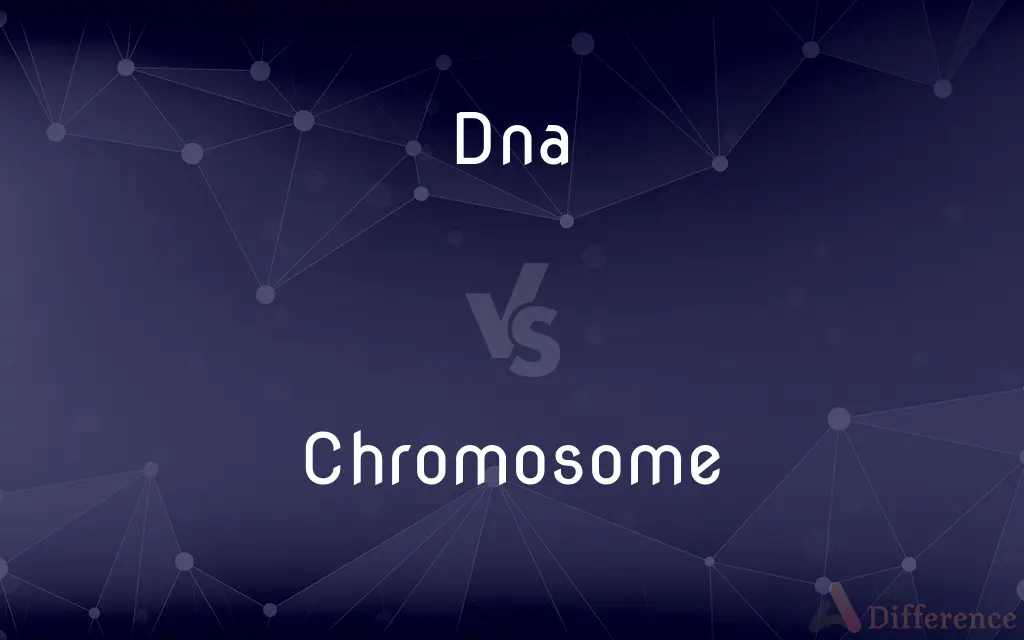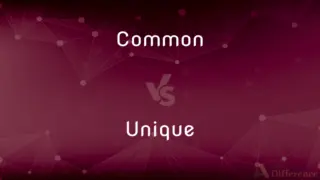DNA vs. Chromosome — What's the Difference?
Edited by Tayyaba Rehman — By Maham Liaqat — Updated on April 15, 2024
DNA is a molecule that encodes genetic information, crucial for biological functions and reproduction, while chromosomes are structures within cells that organize and contain DNA.

Difference Between DNA and Chromosome
Table of Contents
ADVERTISEMENT
Key Differences
DNA, composed of nucleotides, forms the genetic blueprint for living organisms, whereas chromosomes consist of DNA wrapped around proteins, aiding in its organization and gene expression.
DNA is found in almost all living cells, as a double helix structure, whereas chromosomes are visible only during certain stages of cell division.
The sequence of DNA determines genetic traits through genes, while chromosomes ensure these genes are accurately replicated and distributed in cell division.
In humans, DNA is organized into 23 pairs of chromosomes, whereas each chromosome contains hundreds to thousands of genes.
Alterations in DNA sequences can lead to mutations, potentially causing genetic disorders, whereas abnormalities in chromosome number or structure can result in conditions like Down syndrome or Turner syndrome.
ADVERTISEMENT
Comparison Chart
Definition
A molecule encoding genetic information.
Structure containing DNA and proteins.
Structure
Double helix.
X-shaped (during cell division).
Visibility
Not visible under standard microscopy.
Visible during cell division.
Function
Carries genetic instructions.
Organizes and manages DNA for cell division.
Related Disorders
Mutations can cause genetic disorders.
Abnormal numbers or structures cause chromosomal disorders.
Compare with Definitions
Dna
Deoxyribonucleic acid, the material that contains the information that determines inherited characteristics.
DNA sequences are compared in forensic analysis.
Chromosome
Chromosomes ensure the accurate replication and distribution of DNA during cell division.
Abnormal chromosome counts can result in Down syndrome.
Dna
A self-replicating material present in nearly all living organisms as the main constituent of chromosomes.
DNA samples are crucial for biodiversity studies.
Chromosome
Organizational units within cells that facilitate proper DNA segregation.
Chromosome studies are key in cancer research.
Dna
The fundamental and distinctive characteristics or qualities of someone or something, especially when regarded as unchangeable.
DNA testing can determine paternity.
Chromosome
Any of the usually linear bodies in the cell nucleus that contain the genetic material.
Chromosome abnormalities can lead to genetic disorders.
Dna
Molecule carrying genetic instructions for the development, functioning, growth, and reproduction of all known organisms.
Scientists study DNA to understand genetic diseases.
Chromosome
The medium for packaging and managing DNA structurally and functionally.
Each chromosome contains many genes.
Dna
Used metaphorically to denote qualities seen as an intrinsic part of a person's existence or character.
Customer service is in the company's DNA.
Chromosome
A thread-like structure of nucleic acids and protein found in the nucleus of most living cells, carrying genetic information in the form of genes.
Humans have 23 pairs of chromosomes.
Dna
Deoxyribonucleic acid, a self-replicating material which is present in nearly all living organisms as the main constituent of chromosomes. It is the carrier of genetic information.
Chromosome
A chromosome is a long DNA molecule with part or all of the genetic material of an organism. Most eukaryotic chromosomes include packaging proteins called histones which, aided by chaperone proteins, bind to and condense the DNA molecule to maintain its integrity.
Dna
A nucleic acid that carries the genetic information in cells and some viruses, consisting of two long chains of nucleotides twisted into a double helix and joined by hydrogen bonds between the complementary bases adenine and thymine or cytosine and guanine. DNA sequences are replicated by the cell prior to cell division and may include genes, intergenic spacers, and regions that bind to regulatory proteins.
Chromosome
A linear strand of DNA and associated proteins in the nucleus of eukaryotic cells that carries the genes and functions in the transmission of hereditary information.
Dna
Alternative form of DNA
Chromosome
A circular strand of DNA in bacteria and archaea that contains the hereditary information necessary for cell life.
Dna
Abbreviation for deoxyribonucleic acid; - more commonly used than the full name. See also RNA.
Chromosome
A linear arrangement of condensed DNA and associated proteins (such as chaperone proteins) which contains the genetic material (genome) of an organism.
Chromosomes store genetic information.
Dna
(biochemistry) a long linear polymer found in the nucleus of a cell and formed from nucleotides and shaped like a double helix; associated with the transmission of genetic information;
DNA is the king of molecules
Chromosome
One of the minute bodies into which the chromatin of the nucleus is resolved during mitotic cell division; the idant of Weismann.
Chromosome
A threadlike body in the cell nucleus that carries the genes in a linear order
Common Curiosities
How are DNA and chromosomes related?
Chromosomes are made up of DNA. DNA forms the genetic material that chromosomes organize and protect during cell division.
How does DNA differ from a chromosome?
DNA is a long, thin molecule that contains genetic codes, whereas a chromosome is a structure that organizes and protects DNA.
What is DNA?
DNA is the molecule that carries the genetic instructions used in growth, development, functioning, and reproduction of all known living organisms and many viruses.
Are chromosomes visible under a microscope?
Yes, chromosomes can be seen with a microscope, but only during certain stages of a cell's life cycle.
What is a chromosome?
A chromosome is a structure within cells that organizes and contains DNA, which is composed of protein and a single molecule of deoxyribonucleic acid (DNA).
Can changes to DNA affect chromosomes?
Yes, mutations in the DNA sequence can cause structural changes in chromosomes, affecting their function and the organism’s health.
What happens if there is a chromosome abnormality?
Chromosome abnormalities can lead to diseases such as Down syndrome, where there is an extra chromosome 21.
What role do chromosomes play in genetics?
Chromosomes help ensure DNA is accurately copied and distributed in the process of cell division.
How do DNA mutations occur?
DNA mutations can occur due to errors during DNA replication or due to environmental factors like radiation.
What is the primary function of DNA?
The primary function of DNA is to store and transmit genetic information.
What is a gene?
A gene is a segment of DNA that is involved in producing a polypeptide chain; it can influence individual traits and affects health.
Can DNA be repaired?
Yes, cells have mechanisms to repair damaged DNA, though not all damage can be completely corrected.
What is genetic testing?
Genetic testing involves examining DNA sequences to identify genetic differences that may be associated with disease or risk of disease.
How many chromosomes do humans have?
Humans typically have 46 chromosomes, arranged in 23 pairs.
Share Your Discovery

Previous Comparison
Awamori vs. Shochu
Next Comparison
Common vs. UniqueAuthor Spotlight
Written by
Maham LiaqatEdited by
Tayyaba RehmanTayyaba Rehman is a distinguished writer, currently serving as a primary contributor to askdifference.com. As a researcher in semantics and etymology, Tayyaba's passion for the complexity of languages and their distinctions has found a perfect home on the platform. Tayyaba delves into the intricacies of language, distinguishing between commonly confused words and phrases, thereby providing clarity for readers worldwide.













































